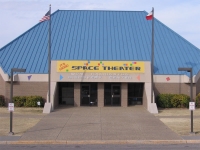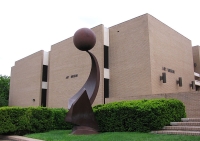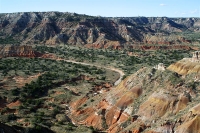City guides


Amarillo Travel Guide
The Old West lives on in the city of Amarillo. About 330 miles (531km) northwest of Dallas-Fort Worth, it is the commercial centre of the Texas Panhandle. Founded in 1887 as a tent camp for buffalo hides and railroad construction workers, the town now hosts symphonies, opera and ballets, as well as boasting both Amarillo College and Texas State Technical College.
Amarillo's fortunes have long rested on the horns of cattle ranching, but it has also become a popular stopover for tourists keen to play cowboy, with numerous motels and restaurants having opened up in recent years. The town is located on the major Route 1-40 east-west highway, making it easily accessible for visitors and those who come for the famed frenetic Amarillo Livestock Auctions.
Things to do in Amarillo
Amarillo is real cowboy country, with its wide plains and beautiful sunsets. The city is home to a number of attractions ranging from fun to just plain eccentric. The Amarillo Museum of Art and the Don Harrington Discovery Center are great places to start exploring, and the Amarillo Botanical Gardens are perfect for a picnic on a sunny afternoon.
Visitors should not miss Amarillo's interactive art projects: the Cadillac Ranch on the I-40 highway, and the Dynamite Museum. Another interesting sculpture near the freeway is Ozymandias on the Plains.
Horse lovers will want to head straight for the American Quarter Horse Hall of Fame and Museum, which celebrates the quintessential American cowboy horse; or attend the Tri-State Fair and Rodeo. Silver Mesa Ranch offers horseback rides and other Wild West experiences. Amarillo is also the gateway to the Palo Duro Canyon, one of the most beautiful areas in the Texas Panhandle.

Don Harrington Discovery Center
Making science a blast of fun, the Don Harrington Discovery Center contains more than 100 hands-on activities and a recently renovated planetarium. An onsite aquarium features both saltwater and freshwater tanks, while its most popular draws include a Foucault pendulum and a tornado machine. Set in a 51-acre park with a lake and picnic spots, visitors will also enjoy its vibrant botanical garden as well as its permanent exhibits on birds of prey, the human body, and other planets' weather systems. Parents might also be interested in its summer camps and special Friday nights, when they can leave children to safely learn and play for hours.

Amarillo Museum of Art
The Amarillo Museum of Art houses a permanent collection that includes 17th through 19th century European paintings, 20th century modernists, Asian art, Middle Eastern textiles, and photography. There are also Edo period Japanese woodblock prints and Southeast Asian sculptures. Famous artists include Georgia O'Keeffe, Franz Kline, Louise Nevelson, Helen Frankenthaler and Francesco Guardi. A Concert Hall building is part of the museum complex and hosts various concerts and talks throughout the year, while the museum regularly stays open in the evening for a special exhibition that is accompanied by live music, street food stations, possibly a demonstration or presentation of some kind, and further activities such as screen-printing tutorials.

Palo Duro Canyon
A million years ago a branch of the Red River carved a massive canyon through the northern Texas plains, forming the Palo Duro Canyon. Its walls plunge down some 1,000 feet (305m), exposing the striking layers of coloured rock strata. The Palo Duro Canyon State Park is also historically significant, marking the state's last battle between American troops and Native Americans. The canyon proves to be a great day out, with picnics, camping and horseback rides. Occasional educational talks are hosted by the park to educate visitors on various aspects of life in the canyon over the years.
Getting Around
The most popular way to get around in Amarillo is hiring a car at one of the international agencies in the city. To hire a car, a full national driver's license, and in some cases and international driver's license, is required and drivers must be at least 25 years (some companies hire cars to those aged 21 to 24 with surcharges). Amarillo has a bus service that runs from Monday through Saturday between 6.15am and 6.45pm and taxis are a good way to get around but must be booked through one of the many private taxi companies operating within the city. Ride-hailing apps such as Lyft and Uber are available.
Amarillo Climate and Weather
Amarillo on the High Plains of the Texas Panhandle has a basically dry, semi-arid climate with four distinct seasons. Summers are scorching hot, and winters can be numbingly cold. The area is prone to severe weather conditions, having experienced ice storms, drought and floods. Average annual rainfall is difficult to calculate, there being little constancy. Rain falls mainly in thunderstorms, some of them quite violent, between March and October. Snow falls between October and April, averaging 15 inches (38cm) a year.
United States of America travel info
Electricity
The electrical current is 120 volts, 60Hz. Plugs are mainly the type with two flat pins, though three-pin plugs (two flat parallel pins and a rounded pin) are also widely used. European appliances without dual-voltage capabilities will require an adapter.
Language
English is the most common language spoken but Spanish is often heard in the south-western states.
Money
The official currency is the US Dollar (USD), which is divided into 100 cents. Only major banks exchange foreign currency. ATMs are widespread and credit cards are widely accepted; Apple Pay and Google Pay are very popular. Banking hours are Monday to Friday 9am to 3pm.
Tipping
A 15 percent tip is expected by taxi drivers, bartenders, hairdressers and waiters, but travellers shouldn't tip in fast-food or self-service restaurants. In expensive restaurants or for large parties, the tip should be 20 percent of the bill. It's normal to tip staff such as valets and porters in hotels; this is discretionary, although a minimum of $5 is expected. Most services are customarily tipped if the service is good.
Health
There are no specific health risks associated with travel within the USA. Medical facilities are excellent, but expensive. Only emergencies are treated without prior payment and treatment can be refused without evidence of insurance or proof of funds. Good medical insurance is essential.
Safety
Travel within the United States is generally trouble-free, though travellers should be aware that the US shares with the rest of the world an increased threat from terrorist incidents. Security has been heightened, particularly at airports. Restrictions on hand luggage apply and travellers are advised to check on the latest situation with airlines in advance. Travellers should also be alert to the dangers of car and street crime in cities and should use common sense and take basic precautions. Hurricanes are common between June and November, putting the southern USA, including the Gulf Coast and the eastern US at risk. There's a risk of wildfires in many dry areas in the US, particularly on the West Coast from March to November.
Local customs
Laws vary from state to state, including speed limit, fines and punishment. The age at which alcohol may be legally bought and consumed is 21 years.
Doing business
In such a large country, filled with so many diverse groups, business practices may differ according to each state, though rarely to any large degree. The East Coast is traditionally more formal than the West Coast, though in states such as California, dress code and conservative appearance are as common as they would be in New York. Punctuality is important throughout the country and it's considered rude to be late for a meeting. Gift-giving is uncommon as it may be construed as bribery. Appropriate titles (Mr, Mrs, Ms) are used upon introduction and until otherwise stated. Americans favour politeness and greetings of 'Hello' and 'How are you?' are often expressed with sincerity. Business hours may vary in each state, but an 8am start and 5pm finish Monday to Friday is the most common with an hour over lunch.
Status and age are not necessarily indicative of seniority, nor do they carry much weight in themselves. Those doing business in the States should be mindful of this fact; foreigners should never make assumptions about someone's position or rank. Best practice is to be respectful to all parties. That said, the US upholds a hierarchal business structure in which 'the boss' is the ultimate decision-maker. Senior leaders have the power of the last word, and can go against the grain just as easily as they can follow popular opinion. Foreigners should concentrate on winning over this individual, even if the greater group seems unsupportive. Americans value a direct style of communication. In this fast-paced, consumer culture 'time is money', and small-talk is viewed as unnecessary and wasteful. It's best for foreigners to get to the point quickly, speak about issues in a frank and open manner, and to avoid taking offence if someone questions or challenges them outright.
Duty free
Travellers to the United States who are returning residents of the country do not have to pay duty on articles purchased abroad to the value of $800 provided their stay was longer than 48 hours and their duty-free allowance was not used in the 30-day period prior. For passengers arriving from Samoa, Guam and the U.S. Virgin Islands, a duty-free allowance of $1,600 is allowed. The following items are included in this: 50 cigarettes and 10 cigars and 150 millilitres (5 fl. oz.) of alcoholic beverages or 150 millilitres (5 fl. oz.) of perfume containing alcohol. Restrictions may apply to goods from Cuba, Iran, North Korea, Burma (Myanmar), Angola, Liberia and Sudan. It is prohibited to import Cuban cigars from any country.
Travellers to the United States who are non-residents do not have to pay duty on the following items: 50 cigars or 200 cigarettes and gifts to the value of $100 provided their stay in the USA is not less than 72 hours and that the allowance has not been used in the preceding six-month period.
Prohibited items for residents and non-residents include meat or meat products, poultry, narcotics, absinthe, plants, seeds, vegetables, fruits, soil, live insects and other living plants or animal pests. Fish is prohibited unless it carries disease-free certification. Wildlife and animals or their by-products carry restrictions. Dairy products and eggs from specified countries are not allowed. Firearms and ammunition are not allowed without the necessary license and permit.
Communications
The international country dialling code for the United States is +1. Mobile networks cover most of the country, especially all urban areas; travellers can purchase local prepaid SIM cards for unlocked phones or use eSIMs if their cellular providers support it on their networks. WiFi is widely available.
Passport & Visa
It is highly recommended that travellers' passports have at least six months' validity remaining after the intended date of departure from them travel destination. A visa is required for short visits unless travellers qualify for entry under the Visa Waiver Program.
The Visa Waiver Program (VWP) enables citizens of certain countries to travel to the US for a stay of up to 90 days without a visa. Visitors under the VWP need a valid Electronic System for Travel Authorization (ESTA), which allows the US government to screen all visitors before travel. Visitors entering the country under the VWP must have a machine-readable passport (MRP) that has a barcode on the photo page. Travellers under the VWP must have passports that include biometrics if they wish to enter the country without a visa, which means that passports must contain unique personal data such as fingerprints or iris details. All passports must contain a digital photo image in order to travel visa-free. All visitors to the USA have a photograph and two fingerprints taken by an inkless scanner on arrival, including those travelling visa-free under the VWP.
As part of the Western Hemisphere Travel Initiative (WHTI), all travellers travelling between the United States and Canada, Mexico, Bermuda, and the Caribbean region are required to present a passport or other valid travel document to enter or re-enter the United States. If departing from the USA, a valid passport is required by immigration authorities. Immigration officials often apply different rules to those stated by travel agents and official sources.
Entry requirements
US citizens require passports.
UK nationals require a passport valid for duration of stay. Most passport holders can get an Electronic System for Travel Authorisation (ESTA) through the Visa Waiver Programme, which allows travel to the US for up to 90 days. The VWP includes tourism, certain types of business visit and transit to another country.
The most important requirement on entering the U.S. is providing proof of Canadian citizenship. A valid Canadian passport is the best document to prove Canadian citizenship and the right to return to Canada. However, several other documents can serve, depending on the mode of transport. Generally, Canadian citizens do not require visitor, business, transit or other visas to enter the United States from Canada, though there are some exceptions.
Passports must be valid for the period of intended stay. If visiting the US for fewer than 90 days, Australian nationals may be eligible to apply for an Electronic System for Travel Authorization (ESTA), and enter under the Visa Waiver Program (VWP).
South Africans must hold a passport valid for duration of stay. A visa is required.
Passports must be valid for duration of stay. Irish nationals can get an Electronic System for Travel Authorisation (ESTA) under the Visa Waiver Programme for entry into the United States.
Passports must be valid for duration of stay. New Zealand nationals can get an Electronic System for Travel Authorisation (ESTA) under the Visa Waiver Programme for entry into the United States.
Useful contacts
United States Tourist Office: www.usatourist.com
911 (General)Embassies / consulates in other countries
United States Embassy, London, United Kingdom: +44 20 7499 9000.
United States Embassy, Ottawa, Canada: +1 613 688 5335.
United States Embassy, Canberra, Australia: +61 2 6214 5600.
United States Embassy, Pretoria, South Africa: +27 12 431 4000.
United States Embassy, Dublin, Ireland: +353 1 668 8777.
United States Embassy, Wellington, New Zealand: +64 4 462 6000.
Embassies / consulates in United States of America
British Embassy, Washington DC: +1 202 588 6500.
Canadian Embassy, Washington DC: +1 202 682 1740.
Australian Embassy, Washington DC: +1 202 797 3000.
South African Embassy, Washington DC: +1 202 232 4400.
Irish Embassy, Washington DC: +1 202 462 3939.
New Zealand Embassy, Washington DC: +1 202 328 4800.


